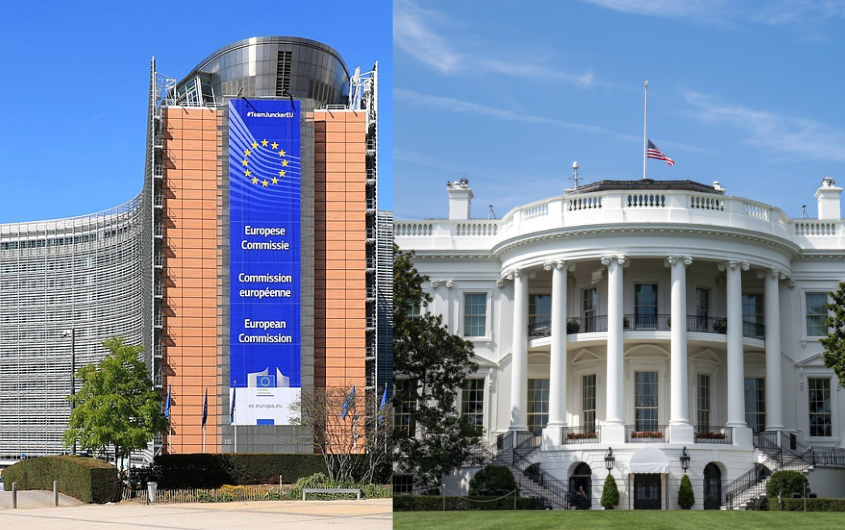
EmDee via Wikimedia Commons and Tia Dufour via Picryl
What Should Europe Do?

Peter S. Rashish
Vice President; Director, Geoeconomics Program
Peter S. Rashish, who counts over 30 years of experience counseling corporations, think tanks, foundations, and international organizations on transatlantic trade and economic strategy, is Vice President and Director of the Geoeconomics Program at AICGS. He also writes The Wider Atlantic blog.
Mr. Rashish has served as Vice President for Europe and Eurasia at the U.S. Chamber of Commerce, where he spearheaded the Chamber’s advocacy ahead of the launch of the Transatlantic Trade and Investment Partnership. Previously, Mr. Rashish was a Senior Advisor for Europe at McLarty Associates, Executive Vice President of the European Institute, and a staff member and consultant at the International Energy Agency, the World Bank, UN Trade and Development, the Atlantic Council, the Bertelsmann Foundation, and the German Marshall Fund.
Mr. Rashish has testified before the House Financial Services Subcommittee on International Monetary Policy and Trade and the House Foreign Affairs Subcommittee on Europe and Eurasia and has advised three U.S. presidential campaigns. He has been a featured speaker at the Munich Security Conference, the Aspen Ideas Festival, and the European Forum Alpbach and is a member of the Board of Directors of the Jean Monnet Institute in Paris and a Senior Advisor to the European Policy Centre in Brussels. His commentaries have been published in The New York Times, the Financial Times, The Wall Street Journal, Foreign Policy, and The National Interest, and he has appeared on PBS, CNBC, CNN, NPR, and the BBC.
He earned a BA from Harvard College and an MPhil in international relations from Oxford University. He speaks French, German, Italian, and Spanish.
As the U.S. presidential election approaches next week, the European Union is readying a package of deterrent or, if necessary, retaliatory actions faced with candidate Donald Trump’s promise of 10-20 percent across the board hikes in tariffs on imported goods should he succeed Joe Biden in the White House. The EU’s positioning is understandable given the threat. But it needs to be remembered that while tit-for-tat trade skirmishes have a long history, they are not always successful at eliminating the original tariff irritants.
Managing a Trump presidency could absorb considerable trade policy resources in Brussels. Yet there are other elements of EU statecraft that are more under its control and that would do more to advance its geoeconomic interests. Two that should be top of mind are concluding the EU-Mercosur trade agreement with four countries in Latin America and creating a unified approach to China’s manufacturing overcapacity.
Not only would success on these two fronts contribute significantly to strengthening the European economy and its global position. These are also efforts the EU should wish to pursue if Kamala Harris is the next President—and ones that she should welcome as they would have the benefit of promoting U.S. international economic objectives as well.
For the European Union—but also for the United States—the key foreign economic policy challenge over the period of the next U.S. presidential term will be how to attract and align with so-called “fence-sitter” countries (Brazil, Indonesia, India, and Vietnam among others) who value their geopolitical independence but also share (or could share) much of the U.S and EU approach to the global economy. Whether the issue is climate change, industrial policy, artificial intelligence, WTO reform, or supply chain security, it will not be possible to promote transatlantic interests without them.
For the European Union—but also for the United States—the key foreign economic policy challenge over the period of the next U.S. presidential term will be how to attract and align with so-called “fence-sitter” countries.
That is why the prospect of the EU finally signing a trade deal with Mercosur (Argentina, Brazil, Paraguay, Uruguay) after twenty-five years of negotiations is so strategically important. As key producers of raw materials like lithium that are crucial for the green transition—but also as growing trade and investment partners for China—deepening ties with these four economies would promote EU values and security. But to bring this negotiation over the finish line, President Emmanuel Macron of France will need to put aside short-term political calculations, drop his opposition, and prioritize the country’s longer-term interests.
The same considerations hold for the EU’s approach to China’s industrial policies. The European Union recently voted to impose tariffs in conformity with WTO rules on imports of unfairly subsidized electric vehicles made in China. The EU is not alone: the United States, Canada, as well as Brazil and Turkey are taking similar steps. Without a level playing field in such a vital sector as e-mobility, not only would jobs be lost in the EU, but it would become more difficult for political leaders to maintain the support of the population for both trade openness and climate action.
But here the obstacle to a united stance is not France but rather Germany, which was one of only a handful of EU member states to vote against the EU tariff measures. Like Paris on the Mercosur trade deal, Berlin needs to adopt a more far-sighted approach when it comes to China’s mercantilism. And that means taking the lead within the EU to forge a common position on Chinese economic practices, rather than pursuing a go-it-alone approach that makes a priority of avoiding potential retaliation from Beijing.
With these shifts, France and Germany would no longer be working at cross-purposes and could once again drive the economic agenda in the EU as they did so effectively during the COVID-19 pandemic.








